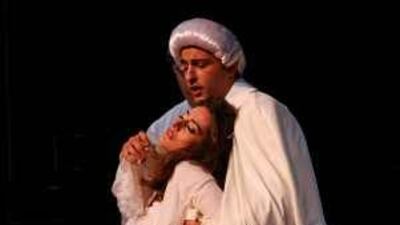Looking back on what it was like to attend the opera as a child, Oscar Hammerstein wasn't impressed. "Listening to people sing words you didn't understand," he said, "wasn't much fun." At the time (Hammerstein grew up in the early 20th century), there wasn't the technology for surtitles so theatregoers had to squint at the minimal action onstage and try to piece the plot together as best they could. Not good enough. Hammerstein got so fed up with it that he created Carmen Jones, his adaptation into modern ebonics of Georges Bizet's masterpiece, Carmen. It's a wonderful example of how opera - so often the peakiest of the arts, at least as far as attendance figures go - can be brought to vigorous life. It just has to speak in one's own language.
Such thinking underlies the Opera in Arabic project, the brainchild of Dr Aly Sadek, an Egyptian-born anaesthetist now resident in London. Since the late 1980s, Sadek has been producing Arabic-language translations of Mozart's operas with a view to making them, as he puts it, "more acceptable, and opera in general more sort of friendly". To this end, no fewer than three of his translations are available in complete recordings. Working with soloists from the Cairo Opera Company, backed by the Polish National Radio Orchestra and the Silesian Chamber Chorus, Sadek's versions of Così Fan Tutte, Don Giovanni and Le Nozze di Figaro have been released in handsome triple-CD sets, including trilingual editions of the book to each work. All three appear on Sadek's own OIA (Opera in Arabic) imprint. A copy of the last-mentioned performance even found its way into the hands of the great cultural theorist Edward Said, who worked a modestly laudatory reference to it into a piece he wrote for Harper's. The article was mainly a counterblast at Said's old nemesis, Bernard Lewis, who had suggested that the Islamic world took no interest in western music. "Unrelieved rubbish," said Said. "I own a commercial CD of Mozart's Marriage of Figaro sung most competently in Arabic." Take a bow, Dr Sadek.
This Figaro seems to have been the best-received of Sadek's seven Mozart translations. Since 1991, it has seen more than 50 performances at the Cairo and Alexandria opera houses; it reportedly drew the largest audience in Cairo opera history. And now it is receiving a complete staging as part of the Al Ain Classics Festival, a follow-up to the successful production of Sadek's Don Giovanni, which took place last year.
For Sadek, an understanding of Mozart's plots is crucial, and not only for a complete appreciation of the work. To get people to sit through it at all, it is necessary to engage them at the level of narrative. "The story is so complicated and so sort of human," he says. "There are so many relations and beautiful personalities, I thought it would be better to present this in Arabic for an Arabic public so that they can really enjoy the story... in this way they can receive the music better. Because they're not short. They're long operas."
Sadek's procedure for translating the work is laborious. Mozart's musical moods can shift in an instant, so he has to get the meaning right "word by word - or sometimes, you know, at least in the same line." To this end, he immerses himself in the original book. "I have to know the operas by heart in Italian," he says. "Then, slowly, slowly, I try to substitute the Italian for the Arabic until I get the real meaning." He adds: "The more you dig, the more you find treasures in the language."
Once he has excavated all he can, there's the conundrum of writing his text out against the musical stave, which of course reads in the opposite direction to Arabic. "I have to write it on the notes, from left to write, in syllables. And all the singers who are working with me in Arabic have learnt to read Arabic the other way around." He chuckles. "They're used to it now." I ask if Sadek was at all tempted to transpose the action of the opera to an Arabic setting - to Jones the Carmen, so to speak. Not at all, he says. "I don't like to, like in some productions in Europe and America, to work on it, make it modern or more old or whatever." His own production is "like a museum piece... and of course this is the first time Arabs are exposed to Mozart, so at least we present to them the original version." The authentic article, then. It's rare enough to get that in Italian. Arabic speakers should be in for a treat.

Translating Mozart's musical moods
Looking back on what it was like to attend the opera as a child, Oscar Hammerstein wasn't impressed.
Most popular today
